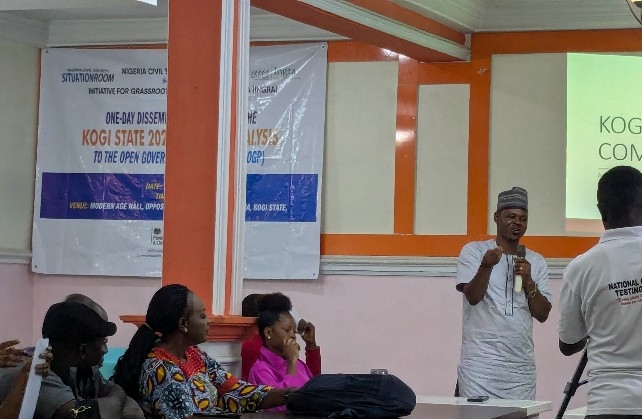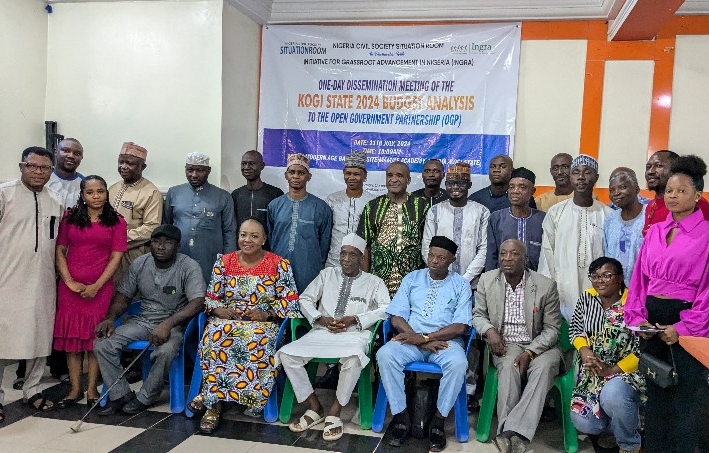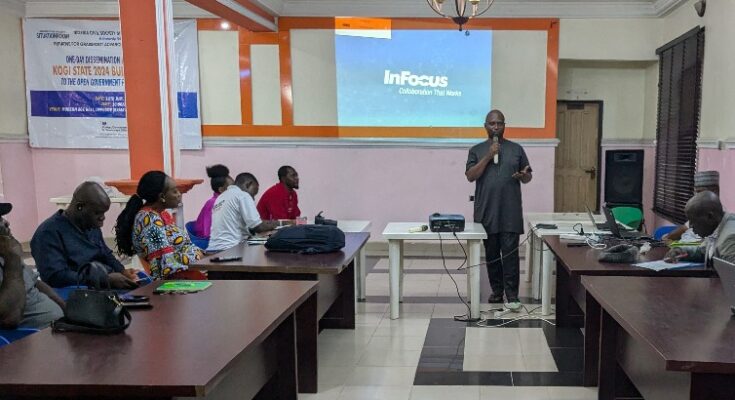Civil society organizations has applauded Kogi state government for taking bold steps to deepen accountability and transparency in governance.
Speaking at a one-day dissemination meeting on Open Government Partnership (OGP) in Lokoja on Thursday, civil society organizations said allocation of N165.1 million for OGP state action plan in the revised 2024 budget by Kogi state government is commendable.
Executive Director of Initiative for Grassroot Advancement (INGRA), Hamza Aliyu, said though the budgetary allocation to OGP was relatively small, the inclusion is good start.
He called for improved funding in line with the initiative of OGP aimed at promoting transparency, empower citizens, fight corruption and harness new technologies to strengthen governance.
Aliyu added that the 2024 revised budget analysis showed that government spending aligns with the five commitment areas within the OGP framework.
“The OGP has four thematic areas which are fiscal transparency, access to Information, service delivery and extractive sector transparency. The five commitments under this thematic areas are enhance citizens participation in the state budget cycle, strengthen public procurement processes in Kogi State, improve citizens’ access to government held information and records.
“Going forward, we need to increase this percentage between the resources given to commitment and OGP which is what citizens are expecting and then the expenditure government it self in other areas of recurrent and overhead expenses. We are saying they need to increase this resources going forward.
“One commitment that stands out is that of extractive industry transparency. There is a commitment that they need to work with communities in the extractive industry which is the coal mine, Obajana community to be able to discuss issues around environment pollution and how it affects the citizens and the amount allocated to Ministries, Department and Agencies (MDAs) by the government. So we are very happy about that one.
“We saw a commitment around the office of the head of service which talks about establishing the serve compact office which we have like SERVICOM at the Federal level. It talks about issues around qualities of service from MDA’s and how Citizens feel about those services. So we are happy that money is being allocated for capacity building.
“Most importantly, is the areas of citizens engagement. We have seen that there is a commitment from the House of Assembly as money were prepared for budget hearing which means that there is this continued culture of engagement with Citizens at the State level especially by the hallow chamber.
“Citizens must be involved in the budget process and must increase the engagement capacity of citizen at all levels. This are commitment we have seen that we are very happy with”.
“We are pleased to see a commitment to capacity building. Notably, there is a commitment by the House of Assembly to engage with citizens in the budgetary process,” he said.
He said that one specific commitment highlighted is extractive transparency, with a focus on working with communities in the extractive industry to address environmental pollution concerns.
Presenting a ‘Review of the Kogi State 2024 Approved Revised Budget, OGP-Related Budgetary Allocations’, the Executive Director of Renaissance Care and Empowerment Foundation (RECEF), Amb. Idris Ozovehe Muraina noted that the Kogi state 2024 approved revised budget offers promising signs regarding the state’s commitment to open government partnership plans.


He stated that the allocation of N165,100,000 across key ministries, department, and agencies suggests a deliberate move by the Kogi state government to focus on achieving positive results.
“The Kogi State 2024 approved revised budget indicates a positive step towards increased transparency and citizens participation. Continued efforts towards implementing these initiatives through fund releases and ensuring public access to information will be crucial for Kogi State to fully realize the benefits of OGP members.
“This revised budget contains items from the OGP State action plans. Kogi State signed up in 2022 and inaugurated the State steering committee in 2024. So far, they have been able to finalize and validate the State action plan.
“The State action plan is the commitment of the State to the people. It has four thematic areas, five special commitment to the state. The State Government has gone ahead to include it in it budget and created a budget line for the four thematic areas and the five commitment.
“A total of N165,100,000 was budgeted across all the five commitment for the State. For us, we have done the analysis and we have given our own comment that we appreciate the fact that the budget is in line with all the thematic areas and commitments of government on OGP. What is left now is release of funds, and implementation,” he said.
Muraina recommended capacity building for government agencies, enhanced oversight and monitoring mechanism and continued stakeholders engagement and collaboration to meet up with the set goals of open government partnership in Kogi state.
In his remarks, the Executive Director, Conscience for Human Rights and Conflict Resolutions (CHRCR), Comrade Idris Miliki Abdul, lamented that citizens are not privileged to engage budget after it has been passed by the State House of Assembly.
He noted that budget is an important component of government which should not be taken for granted, adding that the Kogi State House of Assembly has failed to meet up to their expectations in engaging the non-state actors on oversight function after budget has been passed.
“About 56 billion of supplementary budget was passed without the citizens input. The State Assembly illegally extended the tenure of Local Government Caretaker Chairmen. This is an illegality in the face legitimacy by the Kogi State House of Assembly. It is highly condemnable. You can not tell Kogi people you don’t have money to conduct local government election.
“In February N14 billion came to Kogi State after the former Governor left office and N6.6billion for Local Government came to Kogi State. N7.5billion also came to the State. In the last five months, the same Assembly did not know what came to Kogi State and they are saying the only reason they gave approval to extend the tenure of Caretaker Chairmen was due to lack of funds.
“For the past six months, has the assembly members visited any local government on oversight function to ask what was approved by the assembly and how much was released and used? The answer is No. The current Assembly should visit the 21 local governments to ascertain the level of development. We cannot continue to keep quiet. I have been denied from voting my counsellor in my ward, and my Chairman in my local government due to this extension of the tenure of Caretaker Chairmen,” Miliki lamented.
Also speaking, the Executive Director, Challenged Parenthood Initiative (CPI), Eunice Abimbola Agbogun, commended INGRA for the good work they are doing, but stressed the need for transparency and accountability in governance.
“INGRA has done a very good job to simplify the relationship in terms of co-creation between government and the civic-space. For us to be able to move forward and make impact we need to engage with the Government constantly. I think INGRA has made that possible in all their activities that they started since last year.
“The need for accountability, transparency, and engaging together is very key either for legislatures, executive or Citizens. I think this is the whole essence of what INGRA has been able to do through this project of letting the Citizens of the State participate in issues around budgeting.
“They have succeeded in informing the citizens what exactly is in the budget and how they can be part of the process from the beginning to the final stage. INGRA has been able to do that and am very optimistic that this will go a long way for the development of our dear state,” she said.
The meeting was organized by Nigeria Civil Society Situation Room in partnership with Initiative For Grassroots Advancement In Nigeria (INGRA), supported by Foreign Commonwealth and Development Office (FCDO)




